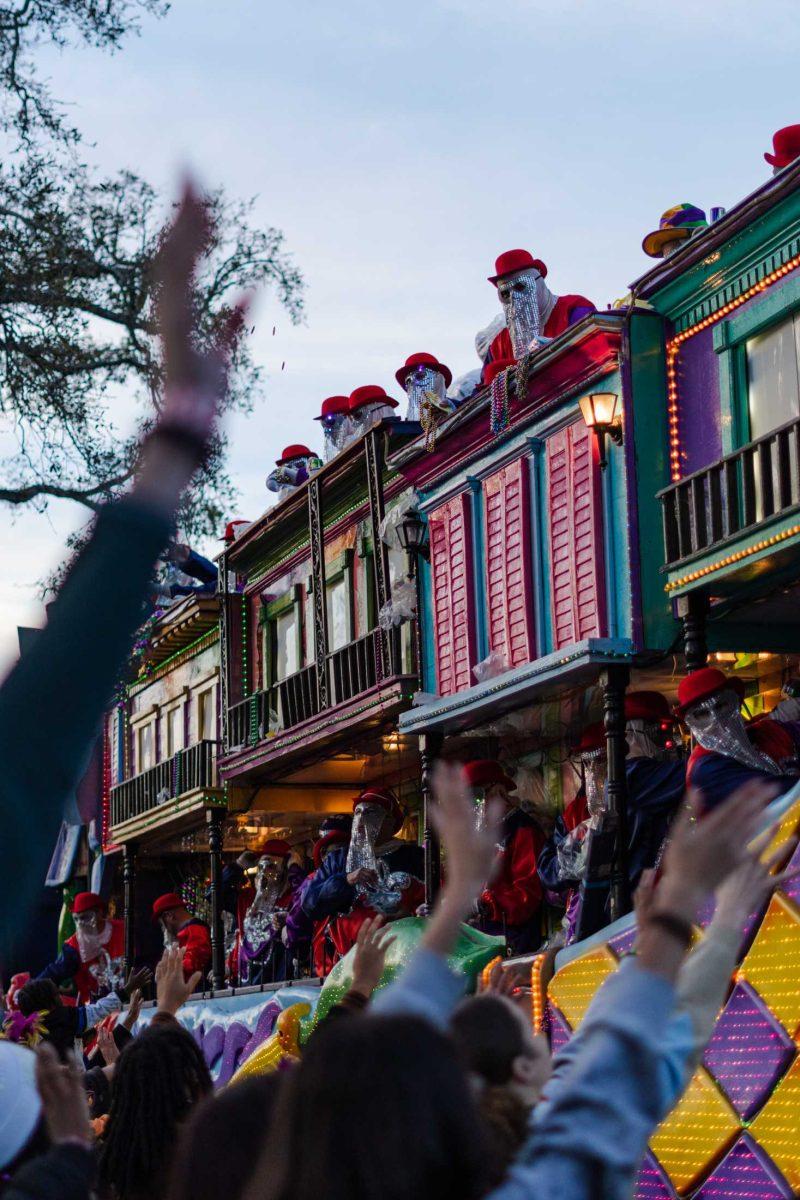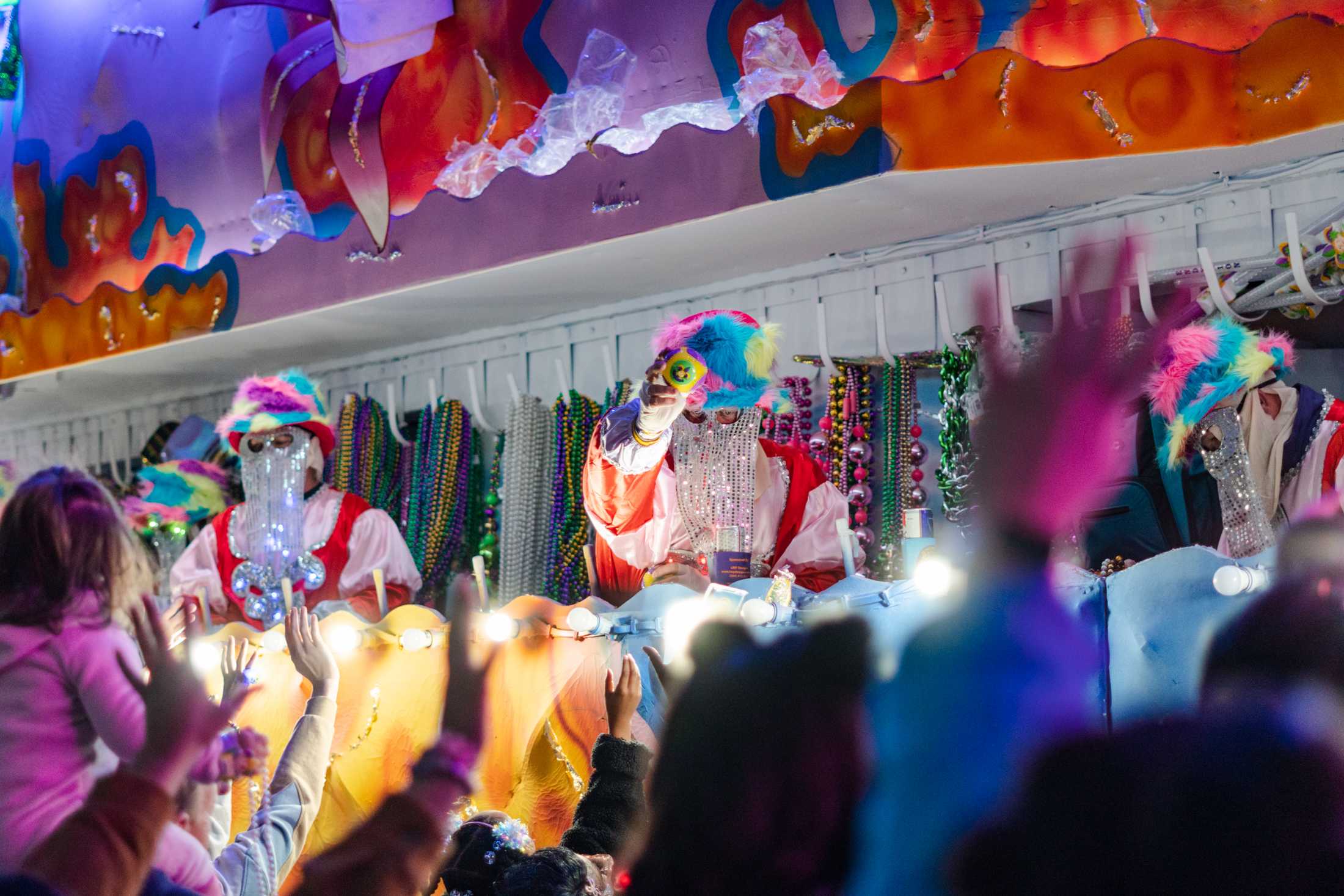Dressed in beads, feathers and masks, Mardi Gras will visit the state Tuesday, Louisiana’s long-held tradition born from French roots.
The French first laid claim in 1682 to the territory that would become Louisiana. The land changed hands, but French traditions and the French language remained. In the late 19th to early 20th centuries, French-speakers in Louisiana were persecuted for their difference from other Americans, but a resurgence in the last 50 years saw the rise, once again, of the French language.
READ MORE: What does Louisiana’s congressional redistricting mean for LSU?
A fundamental part of Louisiana’s long and colorful history is its relationship with France and the French language—from religion to tradition, all the way down to the name Louisiana.
The state’s name, in fact, is a reference to the French monarch, King Louis XIV, who contracted the colonization of the area in the 1700s. At the time, Louisiana was part of a large territory known as New France.
France, like other European countries of the time, saw an opportunity in what they considered the New World, and they wanted to make money off it. France focused on the fur trade, but as time went on, they began to create colonies, and they continued to make money from the land.
Over the years, a unique mix of people gathered in Louisiana. Between the medley of Native Americans, enslaved people of African descent, French settlers and other European settlers, new mixtures of culture arose.
In 1803, Napoleon Bonaparte, then first consul of France, sold the territory to the U.S. The land changed hands politically, but the region’s unique communities thrived.
Creole and Cajun cultures grew. Today, these two groups are the largest French-originating communities in the state.
France is everywhere in Louisiana culture. But from the traditions to the food, the through line is language.
Mardi Gras, in name and spirit, is another good example of the influence France has had on the region. It means Fat Tuesday and celebrates the last day before Lent, the Catholic tradition of prayer and fasting. Mardi Gras originated in France but has come to be synonymous with the culture of Louisiana, especially New Orleans.
The use of the French language in Louisiana doesn’t stop at tradition, however. Living in the state long enough, people will see the word geaux on everything. Eaux is the word for water in French, but eaux sounds like go and the two words are often put together to make geaux.
Louisiana French, commonly referred to as Cajun French, is a catch-all term “for a collection of varieties of French that was first spoken in the region by francophone groups such as colonial French settlers, Canadians, Haitian Creoles, and Acadians,” according to Louisiana based, multi-lingual media platform Télé-Louisiane.
Even though a strong part of Louisiana’s history is linked to the diverse cultures that reside within its borders, the people belonging to those groups haven’t always been treated well.
There was a time in the not-so-far past when many in Louisiana were discriminated against for speaking French, rather than English.
Andre St. Romain, director of education at the West Baton Rouge Museum and a French speaker, has family who witnessed the rejection of Creole by its home state.
“The French language was heavily stigmatized starting in the late 1800s,” St. Romain said in an email to the Reveille. “Speaking French (or Creole) in Louisiana was associated with poverty, a lack of education, and a lack of social class. As such, French and Creole speakers were often discriminated against.”
French schools were essentially banned by Louisiana lawmakers beginning in 1921.
“The general exercises in the public schools shall be conducted in the English language,” reads the Louisiana Constitution of 1912.
The banning done by these schools would not only disenfranchise French-speaking Louisianans but also go on to marginalize French-speaking communities in the state.
“I have met and spoke to many, many people of the generation that learned English as a second language,” St. Romain said. “Almost all of them have a horror story about brutal punishments for speaking French or Creole in school.”
Corporal punishment was still common practice in schools in the early 1900s, St. Romain said, and teachers in public schools who didn’t speak French would often physically discipline students for using the language.
“The already violent methods of discipline in the classroom, anti-French laws and the stigmatization of the French language in Louisiana combined meant that teachers could enforce anti-French rules however they saw fit,” St. Romain said.
In the LSU Library catalog, a number of recorded interviews from Cajun and other Louisiana residents put this past on display. These interviews come from the Bayou Lafourche Oral History Series and include around 20, separate, recorded interviews from Louisianians.
In his oral history interview, Loyman Melancon, a native of Cut Off, Louisiana, tells the wide story of his life, including the role French played in his early memories.
“[I] grew up speaking French, but if you spoke in school they hit your fingers with a ruler,” reads the transcript of Melancon’s words. “Second offense put you on knees with rice or corn, thirty minutes or hour; next time sent to professor [principal?] with a big paddle; next time you were kicked out of school.”
Charles Gaubert, a native of Lockport, Louisiana, also participated in Bayou Lafourche’s Oral History Series. Gaubert shared similar experiences. The transcript of his oral history details that all the family on his mother’s side spoke French but that people in his community often considered those who spoke only French “stupid.”
Gaubert said his father told stories of being hit by nuns at school for speaking his native language rather than English.
READ MORE: Graduate research shines at EGSA 2024 Mardi Gras Conference
“Protestantism and the English language were seen as essential elements of being American,” St. Romain explained, “and as such, the French-speaking (and Creole-speaking) Catholic population was under tremendous pressure to become Americanized.”
Eventually, things began to change. The Council for the Development of French in Louisiana was created in 1968 to “preserve, promote, and develop Louisiana’s French and Creole culture, heritage, and language.”
And in 1980, the federal government recognized Cajuns as a distinct ethnic group after the Roach v. Dresser Industrial Valve and Instrument Division trial.
The case’s plaintiff, Calvin Roach, alleged his employer, Dresser Industries, fired him because he was Cajun. The courts ruled in Roach’s favor, citing the Civil Rights Act, which prohibits discrimination on the basis of race, color, religion, sex or national origin.
The case set precedent for the Cajun people to be protected under the Civil Rights Act.
Public perceptions of Louisiana French have changed drastically since that time, St. Romain wrote to the Reveille.
Still, the decades-long campaign to stymie French in Louisiana had taken its toll on the language’s presence in the state and the community’s expression of culture.
“Obviously, the laws have changed such that the French and Creole languages are no longer legally suppressed,” St. Romain said. “But the damage has been done. Since French (and Creole) have been almost totally removed from daily life in Louisiana, many people are simply unaware that these languages ever existed or were ever significant.”
Today, French culture is seen as valuable, culturally rich and interesting, rather than low-class, St. Romain added: an ironic twist.
But French culture’s comeback is well underway in Louisiana. Throughout the state, French speakers and French immersion schools are on the rise, and residents like St. Romain are learning, practicing and preserving Louisiana French.
According to the Council for the Development of French in Louisiana, there are currently around 100,000 students in French immersion schools in the state. The organization is determined to make more.
CODOFIL President William Arceneaux spoke to the Reveille about his own experience with French.
Arceneaux learned the language at home, he said. All the adults in his family knew French, but he said his parents would never speak it to him and his siblings. Arceneaux said his family’s reasoning for not teaching him was that they wanted to make sure that he could succeed in America. Even so, he listened and learned the language.
When talking about the laws put in place to stop the language, Arceneaux said it was “a result of a very nativistic movement that occurred in the United States in the teens and the twenties.”
Nativism is the practice of favoring citizens born to a country over those who’ve immigrated and been naturalized.
“I love all things French,” Arceneaux said. “I do it to honor my family, my parents, my grandparents, all who did the same. They loved it, and they spoke it fluently. More importantly, I am involved in this so that my children, of whom I have four and grandchildren, know that we are the descendants of French-speaking Acadians. We are the descendants of a people of great courage and great determination and in the face of very difficult circumstances worked to maintain their French language and their French culture.”
Arceneaux also mentioned the programs CODOFIL has in place to keep French alive in Louisiana, touching on the project that’s currently exciting him the most: a new French immersion program at a magnet elementary school in Shreveport.
In addition to his work at CODOFIL, Arceneaux is the chair of a nonprofit called La Fondation Louisiane, which he helped create. Arceneaux said when he and others made the foundation they realized, “the real future of French in Louisiana came from young people who are actively involved in the promotion and speaking of French.”
The foundation arose at a time when CODOFIL didn’t have much funding, so La Fondation became a way to make tangible Arceneaux’s desire to see French language succeed in the state. To encourage a new generation of French-speaking Louisianians, they created scholarships.
“We are a very unique state among the 50 states of our great country,” Arceneaux said. “Every state is a little different, but ours is quite unique. I am pleased to see something of a Renaissance, the realization of how much it means to Louisiana.”






